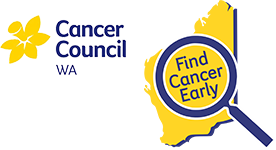Breast cancer advocate encourages women to act at first sign
There is no right or wrong way to check your breasts.
This article was written by Eliza Wynn and published in the Avon Valley and Wheatbelt Advocate on 23 October 2019.
Cancer Council WA is using Breast Cancer Awareness Month as a reminder of two ways to detect breast cancer early.
Cancer Council WA Wheatbelt regional education officer Melissa Pickering recommended all women be breast aware and participate in breast screening when they are eligible.
“Being breast aware and knowing what to look for could help find breast cancer early and increase the chance of successful treatment,” Ms Pickering said.
“Everyone’s breasts are different.
“It is important that you get to know what your breasts look and feel like, so you know what is normal for you.
“There is no right or wrong way to check your breasts.”
Ms Pickering said if you notice any changes for more than four weeks see your doctor.
“Breast cancer remains the most commonly diagnosed cancer among WA women – and the second highest cause of cancer death,” she said.
“WA women have a one in 10 chance of being diagnosed with breast cancer by the age of 75 and in 2017, 268 Western Australian women died from breast cancer.
“The Australian Institute of Health and Welfare predicts over 19,000 people in Australia will be diagnosed with breast cancer this year.
“Of this, 99.2 per cent will be women and 0.8 per cent will be men.”
Breast cancer champion and Kalgoorlie resident Asha de Brun, who was diagnosed with breast cancer this year knows all too well how important it is to react quickly to breast changes and said regional women need to listen to their bodies.
Ms de Brun visited her GP when her right breast became enlarged and painful, and she was feeling fatigued.
When she was diagnosed with breast cancer Ms de Brun undertook a treatment plan including surgery, chemotherapy, radiation, physio and hormone therapy.
“Don’t self diagnose, go and see a doctor,” she said.
“It’s easier for you and the doctors to help you if you get checked out as soon as you notice something.
“Don’t be late.”
Ms Pickering said women from regional WA were particularly likely to delay going to a medical clinic when they were experiencing symptoms, with many experiencing self-doubt about the existence of the symptom.
“If you’re unsure about a possible symptom you should make an appointment to discuss the change with your doctor, clinic nurse or Aboriginal health worker as soon as possible, particularly if it’s been four weeks since you first noticed the change,” she said.
For more information about breast cancer symptoms, visit www.findcancerearly.com.au or call 13 11 20.
Ms Pickering said the second way to detect breast cancer early was by participating in breast screening with BreastScreen WA.
Eligible women aged over 40 years who do not have breast cancer symptoms are encouraged to participate in free breast screening by calling 13 20 50 or booking online.
Women aged between 50 and 74 will be sent an invitation letter in the mail when the van is coming to their area.
The mobile BreastScreen WA van will visit Beverley until October 30, York from October 31 to November 13 and Northam from November 14 and January 24.
